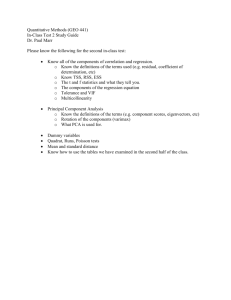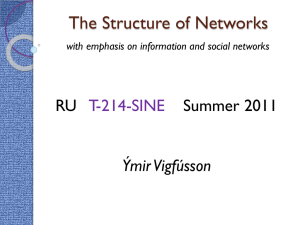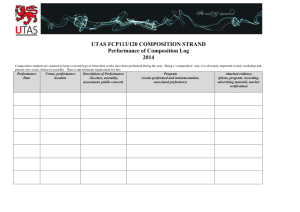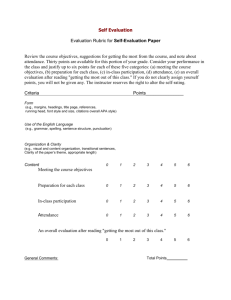Fisher Tifft BSP-RR Institute Presentation updated
advertisement
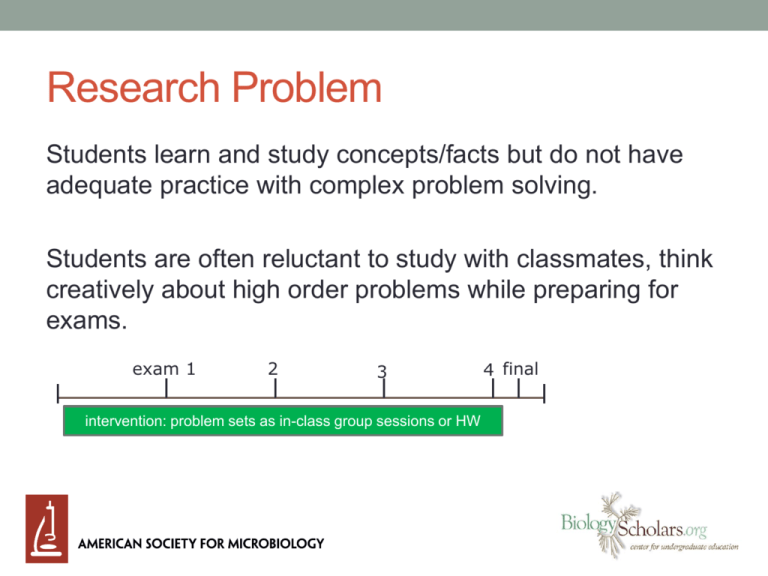
Research Problem Students learn and study concepts/facts but do not have adequate practice with complex problem solving. Students are often reluctant to study with classmates, think creatively about high order problems while preparing for exams. exam 1 2 3 intervention: problem sets as in-class group sessions or HW 4 final Research Question • Do in-class group problem solving sessions affect student learning and/or approach to studying for biochemistry? • Large core lecture course (~400 students), only one section • Sophomores, juniors, and seniors • Biology majors and non-majors (public health, neuroscience, chemical and medical engineering and others) • Often the first course in which our students encounter experimental data and interpretation and synthesis questions in biology Research Methods exam 1 SS + CI 2 in-class HW 4 final 3 in-class SS in-class SS + CI SS + CI in-class year 2 HW SS year 1 SS + CI Data collected Analysis Concept inventory responses Quantitative Learning gains Exam performance Overall exam performance Concept-specific question performance Survey responses Qualitative and quantitative (openended and directed choice questions) Demographics (major, year) Nominal data to identify groups Logistics • Randomly-assigned groups of 5 students • 10 facilitators (4 faculty + 6 teaching assistants) • Each participant receives 5 points for participating, 5 points for their group answers (one IF-AT form per group). This is equivalent to a single homework assignment, 0.4% of overall course grade • Students will be assigned group roles: time keeper, sergeant at arms, answer recorder, etc. • Problem sets will be ~10 questions related to a single topic relevant to human disease and biochemistry • One logistical challenge will be arranging groups within the traditional lecture hall Study strategy survey (draft) • The following questions are focused on your current approach to studying and doing homework assignments in science classes (or in biochemistry). (could separate “studying” from “homework” into separate questions) • Do you currently study with a partner or group? Y/N • If you work with a partner or group, who are your study partners? • • • • • • • Students who have taken biochemistry before Students who you met in biochemistry class Students who you met in recitation Students who you met in biochemistry lab Students who you met in previous science courses, please specify the course(s) in which you met: Students who you met from dorms/suitemates Other, please specify: • Why do you choose to work with study partners or groups? • How effective are each of the following approaches in your experience? • highly, somewhat, neutral, not effective, I do not use this approach • Listening to podcasts • Making and studying flashcards/memorization • Making concept maps • Using practice problems and old exam questions • Inventing and answering your own questions • Reading the textbook, highlighting • Other • For the mid- and post-semester versions of the survey: • If your strategy has changed to work with more people, what prompted this change? • If your strategy has changed to work with different people, what prompted this change? • If your strategy has changed to work with fewer people, what prompted this change? Alignment of Research Question and Methods This is why I think it aligns: • Our experimental design separates the problem sets themselves from the in-class group work • Surveys directly address student study strategies • CI and exam questions directly measure learning of concepts from the problem sets The data will help me answer my question by: Tool Comparison Conclusion CI and exams years 1 and 2 overall gain Intervention affects concept learning Intervention affects overall learning Study survey Pre- and mid- year 1 Changes occur without intervention Mid and post year 1 Changes occur with intervention years 1 and 2 mid-semester gain Changes occur with intervention years 1 and 2 overall gain Early intervention affects studying


